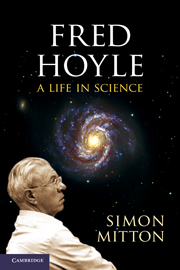Book contents
- Frontmatter
- Contents
- FOREWORD
- PROLOGUE
- 1 AN END AND A BEGINNING
- 2 TRAINING FOR COSMOLOGY
- 3 THE STAR MAKERS
- 4 HOYLE'S SECRET WAR
- 5 THE NATURE OF THE UNIVERSE
- 6 LIVES OF THE STARS
- 7 CLASH OF TITANS
- 8 ORIGIN OF THE CHEMICAL ELEMENTS
- 9 MATTERS OF GRAVITY
- 10 MOUNTAINS TO CLIMB
- 11 THE WATERSHED
- 12 STONES, BONES, BUGS AND ACCIDENTS
- ACKNOWLEDGEMENTS
- NOTES
- BIBLIOGRAPHY
- INDEX
- Plate Section
12 - STONES, BONES, BUGS AND ACCIDENTS
Published online by Cambridge University Press: 03 May 2011
- Frontmatter
- Contents
- FOREWORD
- PROLOGUE
- 1 AN END AND A BEGINNING
- 2 TRAINING FOR COSMOLOGY
- 3 THE STAR MAKERS
- 4 HOYLE'S SECRET WAR
- 5 THE NATURE OF THE UNIVERSE
- 6 LIVES OF THE STARS
- 7 CLASH OF TITANS
- 8 ORIGIN OF THE CHEMICAL ELEMENTS
- 9 MATTERS OF GRAVITY
- 10 MOUNTAINS TO CLIMB
- 11 THE WATERSHED
- 12 STONES, BONES, BUGS AND ACCIDENTS
- ACKNOWLEDGEMENTS
- NOTES
- BIBLIOGRAPHY
- INDEX
- Plate Section
Summary
An immediate consequence of his resignation was that Hoyle was no longer the holder of a mainstream university post, and therefore he would no longer have research students, postdoctoral research assistants or research staff alongside him. Barbara Hoyle would have to function as his typist, his diary manager and his publishing agent. The professor who believed so strongly in high-quality support for research had suddenly cut himself off: at the mundane level, he no longer had the right to use a photocopier free of charge and, more seriously, he could no longer apply to the Science Research Council (SRC) for research funding. Worse still, he had resigned ten years before the retirement age and this would have a devastating impact on his future income.
Did he really have to do this? If instead of resigning the chair, he had simply resigned the remaining months of his directorship of the Institute of Theoretical Astronomy (IoTA), he could still have made his point. Though his Plumian chair was assigned to the new Institute of Astronomy, he could have worked from St John's College or from home. So long as he had carried out any teaching duties required of him, the university would have left him alone. He would have been free to travel to Caltech, to write books and to give acclaimed public lectures. Perhaps he could have developed a sideline as an antiestablishment pundit with a radical newspaper column.
- Type
- Chapter
- Information
- Fred HoyleA Life in Science, pp. 293 - 323Publisher: Cambridge University PressPrint publication year: 2011

